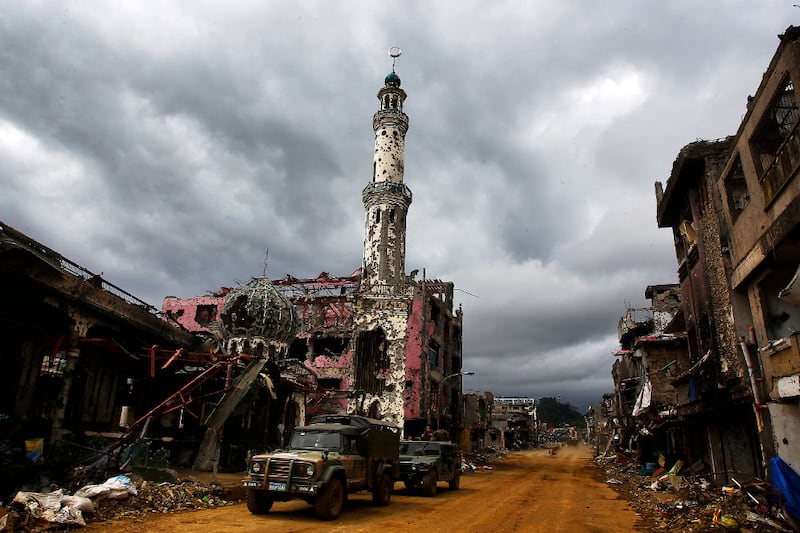With weeks to go until a new president takes over in the Philippines, displaced residents of war-torn Marawi are demanding they be allowed to return to and rebuild their homes nearly five years after government forces expelled Islamic militants who had seized the southern city.
On Monday, hundreds among the thousands of locals who remain uprooted here rallied on the anniversary of the day marking the start of the militant takeover in 2017. The attack by pro-Islamic State extremists provoked a five-month battle with government forces that destroyed much of this lakeside city.
Five years on, many of the displaced people live in temporary shelters on the outskirts of Marawi. They said they were prevented from reclaiming their lands in the “most affected areas” that are still littered with unexploded ordnance from the past fighting between government forces and the militants.
“The IDPs (internally displaced persons) are fed up with the unreliable livelihood they have in the temporary shelters,” said Amenodin Cali, director of the Reclaiming Marawi Movement.
“They want to go home to rebuild their homes,” he said.
If not allowed to visit their homes soon, he warned, “we will forcibly occupy the area.”
President Rodrigo Duterte, who will hand over the reins of government to presumptive President-elect Ferdinand Marcos Jr. in late June, signed a law in April that creates a government board to determine compensation for those displaced from Marawi.
The Republic Act 11696 (the Marawi Siege Compensation Act of 2022), which he signed, calls for the creation of a board headed by a chairperson and eight members.
The board’s members have not yet been named, and people here say the members should be mostly local residents and professionals.
“Now that the Marawi compensation law is passed, we are hoping for its swift and judicious implementation and those who will compose the Marawi Compensation Board will have a deep understanding of Maranao culture and context,” said Jalilah Sapiin, a Lanao del Sur province teacher and member of the Marawi Reconstruction Conflict Watch, a local non-government organization.

There is a widespread but understated fear in the region that after Marcos won the May 9 general election, Muslim areas in the south would not be given priority in congressional budgetary appropriations under the incoming administration.
Congress is responsible for passing the country’s annual spending plan. While budgetary hearings begin every third quarter, appropriate funding requirements for specific purposes with regard to Marawi should have been identified already, observers said.
Former guerrilla leaders who are officials in an autonomous Muslim area in the south had backed Marcos’s rival, Leni Robredo, and campaigned against the son of Ferdinand E. Marcos, the late Philippine dictator whom they blamed for extreme bloodshed.
Without giving specific details, Cali called on Marcos to improve rehabilitation efforts and allow those displaced to return home by December or, he said, they would take “direct action.”
For now, however, Cali said that the internally displaced people had adopted “a wait-and-see stance” on who Marcos would appoint to head the compensation board.
“The IDPs do not want the board to be politicalized. They want the board to help them,” Cali said.
‘Without money or clothes’
Aisha Radia, one of the displaced resident of Marawi and a mother of 10, took part in Monday’s demonstration.
“We did not wish this thing to happen. We left our homes without money or clothes,” she said.
She and her family spent the early months after fleeing Marawi at the Lumbacatoros Saguiaran shelter, begging for food and money. She said she would not hesitate to join her fellow IDPs if they called for more protests against the government.
Task Force Bangon Marawi manager Felix Castro Jr. dismissed as untrue the criticism of the government by the people who rallied here on Monday.
More than 1,000 residents had received permits to rebuild their houses in the most affected area in downtown Marawi, he said.
“Apparently many are waiting for the money that they could get from the Marawi Compensation Board,” Castro told BenarNews.
The task force has been involved in construction of a sports stadium, convention center, reconstructed mosques and parks as part of the reconstruction efforts, he said.
The national coordinator for the group Interfaith Cooperation Forum, however, questioned the need for such projects.
“All these newly constructed government buildings and mosques are nothing without the residents returning to their homes,” Tirmizy Abdullah said before the rally. “The residents did not ask for them.”
